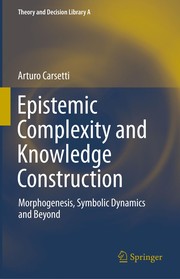
Epistemic Complexity and Knowledge Construction
By Arturo Carsetti
Subjects: Dynamical Systems and Complexity Statistical Physics, Genetic epistemology, Philosophy of mind, Theory of Knowledge, Computer simulation, Philosophy (General), Cognitive psychology, Simulation and Modeling, Philosophy, Consciousness
Description: As is well known, cognition is not only a self-organising process. It is also a co-operative and coupled process. If we consider the external environment as a complex, multiple and stratified Source which interacts with the nervous system, we can easily realise that the cognitive activities devoted to the "intelligent" search for the depth information living in the Source, may determine the very change of the complexity conditions according to which the Source progressively expresses its "wild" action. In this sense, simulation models are not neutral or purely speculative: the true cognition actually appears to be necessarily connected with successful forms of reading, those forms, in particular, that permit a specific coherent unfolding of the deep information content of the Source. Therefore, the simulation models, if valid, materialise as "creative" channels, i.e., as autonomous functional systems, as the very roots of a new possible development of the entire system represented by mind and its Reality.
Comments
You must log in to leave comments.